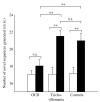Strategy implementation in obsessive-compulsive disorder and trichotillomania
- PMID: 16202188
- PMCID: PMC1867316
- DOI: 10.1017/S0033291705006124
Strategy implementation in obsessive-compulsive disorder and trichotillomania
Abstract
Background: The use of strategies to aid performance when undertaking neuropsychological tasks is dependent on intact fronto-striatal circuitry, and growing evidence suggests impaired spontaneous use of strategies in patients with obsessive-compulsive disorder (OCD). However, studies to date have not examined the effects of strategy training on task performance in OCD or in trichotillomania (compulsive hair-pulling, a condition that has been argued to share overlap with OCD in terms of phenomenology and co-morbidity).
Method: The ability to generate novel visuospatial sequences using a computer interface was examined before and after undertaking optimal strategy training in 20 OCD patients, 17 trichotillomania patients, and 20 controls (matched for age, education, and IQ).
Results: OCD patients failed to improve ability to generate novel sequences above baseline despite successfully completing strategy training to the same extent as other groups. In contrast, performance of trichotillomania patients improved significantly after training to the same extent as controls. Groups did not differ on memory span, trial-by-trial action monitoring, or ability to generate novel visuospatial sequences prior to strategy training.
Conclusions: Strategy implementation deficits, suggestive of cognitive inflexibility and fronto-striatal dysfunction, appear integral to the neurocognitive profile of OCD but not trichotillomania. Future research should investigate cognitive flexibility in obsessive-compulsive spectrum disorders using a variety of paradigms, and clarify the contribution of specific neural structures and transmitter systems to deficits reported.
Figures


Similar articles
-
A neuropsychological comparison of obsessive-compulsive disorder and trichotillomania.Neuropsychologia. 2007 Mar 2;45(4):654-62. doi: 10.1016/j.neuropsychologia.2006.07.016. Epub 2006 Sep 26. Neuropsychologia. 2007. PMID: 17005210
-
Motor inhibition and cognitive flexibility in obsessive-compulsive disorder and trichotillomania.Am J Psychiatry. 2006 Jul;163(7):1282-4. doi: 10.1176/ajp.2006.163.7.1282. Am J Psychiatry. 2006. PMID: 16816237
-
Frontal-striatal dysfunction during planning in obsessive-compulsive disorder.Arch Gen Psychiatry. 2005 Mar;62(3):301-9. doi: 10.1001/archpsyc.62.3.301. Arch Gen Psychiatry. 2005. PMID: 15753243
-
Compulsivity in obsessive-compulsive disorder and addictions.Eur Neuropsychopharmacol. 2016 May;26(5):856-68. doi: 10.1016/j.euroneuro.2015.12.003. Epub 2015 Dec 11. Eur Neuropsychopharmacol. 2016. PMID: 26774279 Review.
-
Cognitive Inflexibility in OCD and Related Disorders.Curr Top Behav Neurosci. 2021;49:125-145. doi: 10.1007/7854_2020_198. Curr Top Behav Neurosci. 2021. PMID: 33547598
Cited by
-
Obsessive-compulsive disorder, impulse control disorders and drug addiction: common features and potential treatments.Drugs. 2011 May 7;71(7):827-40. doi: 10.2165/11591790-000000000-00000. Drugs. 2011. PMID: 21568361 Review.
-
Neurochemical modulation of response inhibition and probabilistic learning in humans.Science. 2006 Feb 10;311(5762):861-3. doi: 10.1126/science.1121218. Science. 2006. PMID: 16469930 Free PMC article. Clinical Trial.
-
Effects of gender and executive function on visuospatial working memory in adult obsessive-compulsive disorder.Eur Arch Psychiatry Clin Neurosci. 2015 Dec;265(8):707-18. doi: 10.1007/s00406-015-0604-2. Epub 2015 May 14. Eur Arch Psychiatry Clin Neurosci. 2015. PMID: 25972085
-
Trichotillomania is more related to Tourette disorder than to obsessive-compulsive disorder.Braz J Psychiatry. 2020 Jan-Feb;42(1):87-104. doi: 10.1590/1516-4446-2019-0471. Braz J Psychiatry. 2020. PMID: 31576938 Free PMC article. Review.
-
Cognitive symptoms facilitatory for diagnoses in neuropsychiatric disorders: executive functions and locus of control.Neurotox Res. 2008 Oct;14(2-3):205-25. doi: 10.1007/BF03033811. Neurotox Res. 2008. PMID: 19073427
References
-
- Alexander GE, DeLong MR, Strick PL. Parallel organization of functionally segregated circuits linking basal ganglia and cortex. Annual Review of Neuroscience. 1986;9:357–381. - PubMed
-
- APA . Diagnostic and Statistical Manual of Mental Disorders IV (DSM-IV) Washington, DC: American Psychiatric Association; 1994.
-
- Botvinick M, Nystrom LE, Fissell K, Carter CS, Cohen JD. Conflict monitoring versus selection-for-action in anterior cingulate cortex. Nature. 1999;402:179–181. - PubMed
-
- Cabrera AR, McNally RJ, Savage CR. Missing the forest for the trees? Deficient memory for linguistic gist in obsessive-compulsive disorder. Psychological Medicine. 2001;31:1089–1094. - PubMed
-
- Carter CS, Botvinick MM, Cohen JD. The contribution of the anterior cingulate cortex to executive processes in cognition. Reviews of Neuroscience. 1999;10:49–57. - PubMed
Publication types
MeSH terms
Grants and funding
LinkOut - more resources
Full Text Sources
Medical

